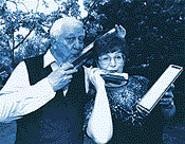"I got lucky," says Al, husband half of the Harmonica Hotshots, a vaudeville-style duo that traverses the country with renditions of "Lady of Spain" and "Sabre Dance." "How many women harmonica players do you meet? One."
Fate thrust them together, and their exoticism in the harmonica world made it stick. Al plays the chord harmonica, a freakish, two-foot-long model that makes him look like he's eating a giant corn-on-the-cob when he's playing. Judy's instrument of choice is the fat, multitiered bass harmonica.
"You have a lot of lead players that need accompaniment," explains Judy. "So they would say, "Oh, we'll get Judy to play bass and Al to play chord.' So we were together a lot of the time, running over numbers in somebody's room."
Then Al found out that Judy owned about 150 harmonicas -- even more than he did. "That's when the cards and letters really started coming," says Judy.
They were married in a military-style wedding, the "Wedding March" played by a harmonica trio. Rather than a gauntlet of swords, the couple walked through a gauntlet of harmonicas.
"Chords on one side, basses on the other," says Judy.
At first, they made their home in Sacramento, California, beside a six-lane expressway. That was too loud, so when they retired, they moved to a country retreat near Akron, Judy's hometown. At last, they could play their harmonicas in peace. But not in seclusion. They're performers, not hermits.
In winter, they pack up their sequined top hats and go tour in the Texas Rio Grande Valley. In summer, they host harmonica cruises to the Caribbean, in which everybody gets a free harmonica and plays for several hours each day.
"Harmonica players are a special breed, because they always seem to be looking for other harmonica players," says Al. "So they socialize a lot."
Harking back to a time when "entertainment" meant "lots of props," Al and Judy's stage routine involves bow ties, corny jokes, and enough harmonicas to supply a small European country, ranging in size from tiny to jumbo.
"Judy and Al are kind of holding down the old style, the music we love so much but don't get enough of anymore," says Robert Williams, president of the Society for the Preservation and Advancement of Harmonicas, based in Detroit. "The other people out there who are making a living tend to be basically blues and jazz players."
According to Williams, the Hotshots are probably the most active harmonica group in the country. That's a lot of retirement homes, county fairs, and private parties.
"The last time we were in the Rio Grande, we played 60 shows in 60 days," says Al. "What's it like? I'll tell you what it's like. When you're loading equipment into the van the first time, you're saying, well, 60 more times I do this, and I can go home."
Meanwhile, the crowd laps it up. At a recent Hotshots' performance at the Warrensville Heights Library, about 200 people are packed in like canned hams.
Did somebody say ham?
"If you'd like to leave your name and your seat number, we'll wake you up after the show," Al jokes, launching into "Tarantella."
As he blows, his eyes look like they're about to pop out of his skull. It's the harmonica player's version of a smile. He and Judy tilt their heads coyly toward each other -- as coyly as they can with puffy cheeks.
In between an inspired "Petticoat Junction" and a fierce "Hawaiian War Chant," Al announces that he will treat the crowd to his Grover Cleveland impersonation.
"Hi, I'm Grover Cleveland; anybody gonna dispute that?" A guy in the third row guffaws.
"He's just like Jerry Lewis," the man sputters, slapping his leg. "Just like Jerry Lewis."
A rousing medley of George M. Cohan songs ensues, as well as a Latin number called "Brazil," in which Al demonstrates his ability to play the harmonica in one hand and shake the maracas in the other. Then a joke about a guy shaving a chicken, and the "Mexican Hat Dance," done with sombreros.
Ambidextrous in his instrument of choice, no sooner has Al played one contraption -- two harmonicas held together with rubber bands, so he can easily jump octaves -- than he whips out another: a set of pitch pipes taken apart and affixed to the fingers of a pair of gloves.
He inherited the gloves from one of his idols, an old-time harmonica group called the Madcaps. When he was still a cub harmonica player, he had seen them play on a TV variety show and was blown away. Consorting in harmonica circles, he eventually befriended the group. Twenty years later, when the bandleader died, his 98-year-old mother called Al.
"She didn't know what to do with all of his harmonicas," he says. "I told her I would take them to one of the harmonica conventions and sell them and give her the money. I sold them all, but with one stipulation. I wanted the gloves."
But once he had them, he couldn't remember what song they played. It had to fit the 10 notes on the gloves.
"I had to search and search, and went through thousands of tunes. I found only one that could be played, "I Don't Know Why (I Love You Like I Do)." I found out later that that was the song!"
Al himself went on to an illustrious harmonica career. In the Navy during World War II, his passion got him special dispensation from chore duty.
"We used to scrub the floors every night," he says. "They had 50 bunks in the barracks, and they'd push 'em all to one end and scrub one end, then push 'em to the other end and scrub the other end. But I never had to do any scrubbing, because they would set me up on a bunk with the harmonica, and they'd do the mopping while I played."
But then came that fateful day when the accordion player showed up.
"He put me out of business," he says. "They put him on the bunk. They were sick of the harmonica."
But Al wasn't. He formed a harmonica trio with a couple of Navy buddies. A Sgt. Bilko character in the band finagled ways to get them off the ship for gigs in Europe, once even squiring an admiral's limo for the journey. The trio ultimately wound up on The Arthur Godfrey Talent Hour, one of the very first TV shows, playing a boogie-woogie tune that went over like stale Crisco with the crowd.
"We didn't win, and not only didn't we win, but we were the only losers," he says. "There were three contestants -- the other two were singers -- and both of the singers were declared winners."
After the war, a telegram from a midget landed Al in showbiz. ""Be in Hollywood, tomorrow.' And I was in Hollywood tomorrow." The midget, named Johnny, was actually the bandleader of the Harmonica Rascals, sort of the Rolling Stones of the harmonica world. They were big, both because of their mellifluous harmonies and their zany midget antics, much of which involved Johnny tugging on a tall guy's coattails, running through his legs, and sitting on his lap, begging to play the harmonica.
Most people, but not all, saw the humor in it.
"We were playing at the Moulin Rouge," says Al. "One guy had a little too much to drink and jumped up on the stage with a knife, right in the spotlight. "Let the little guy play!' He scared us half to death."
Judy honed her first Hohner in the 1970s in a class at the University of Akron, then joined a local group called the Rubber City Capital Harmonica Players. While the harmonica took Al around the world, it didn't get her past the parking lot.
"I used to work at Alside, the original aluminum siding company," she says. "And instead of going to lunch, I'd go outside and sit in my car and practice my harmonica. Hot weather, cold weather, you name it. I was out there for 45 minutes.
"They thought I was a little strange. "What's she doing out there?' I said, "Oh, I go out there and play my harmonica.' "Harmonica?'"
Such sick fascination turned out to be the beginning of her teaching career. One of her co-workers took an interest and requested lessons.
"For about a month, we'd go out into the car together, and I'd give him a lesson, and we'd practice together. But I wasn't getting enough practice for myself. So I said, "Now, listen, you've gotta get some practice on your own. You're holding me back.'"
Her teaching continues on the high seas, where the guests' itinerary includes a two-hour lesson every day, plus unlimited playing time on the deck or in their cabins. The 40 or so harmonica cruisers tend to stick together, being segregated at dinner from the hundreds of non-harmonica-playing cruisers.
Judy, a self-professed slobbery harmonica player, says she and Al complement each other well, though sometimes the artiste gets the best of him.
"This one year, things were not coming together," laughs Judy. "He's real irritated, and he's flexing his baton, and he's threatening to reach out to the ones in the front row and tap them on the head. I said, "You better be careful, that thing's gonna break.' And it did."
They then decided it would be best if Judy taught the beginners and Al worked exclusively with the players whose repertoire extends beyond "Turkey in the Straw."
Alice Crippen -- who takes the harmonica cruises with her husband, David, because she's hard-pressed to find a harmonica teacher in her hometown -- is one of Al's charges. He has "all the patience in the world," says the 76-year-old grandmother from Mesa, Arizona, "as long as you play the notes on the page."
There are few things worse in the world than snobby harmonica players, but the Smiths try hard not to cop a 'tude.
"They're down-to-earth people, despite the fact they play a darned good harmonica," says Crippen. "That's what I like about them. Just because they're the Hotshots, they don't walk around like "Hey, see what I can do.' They're just like everyone else. They work in their garden in the summer and do different things." And if the tomato plants look a little droopy, there's nothing like an impromptu round of "Turkey in the Straw" to perk things up.
Laura Putre can be reached at [email protected].














